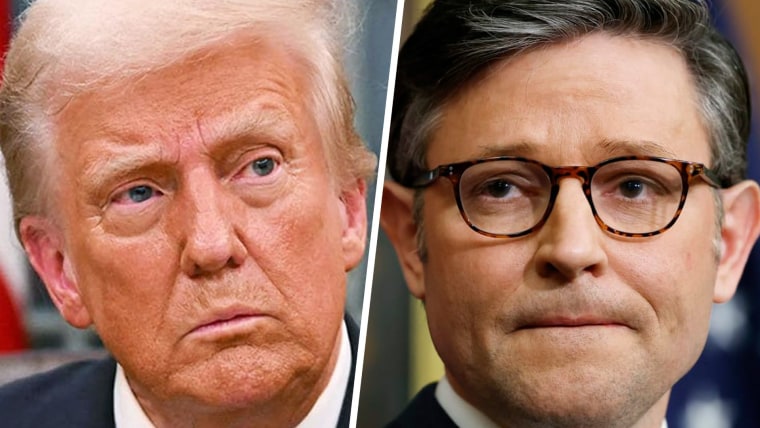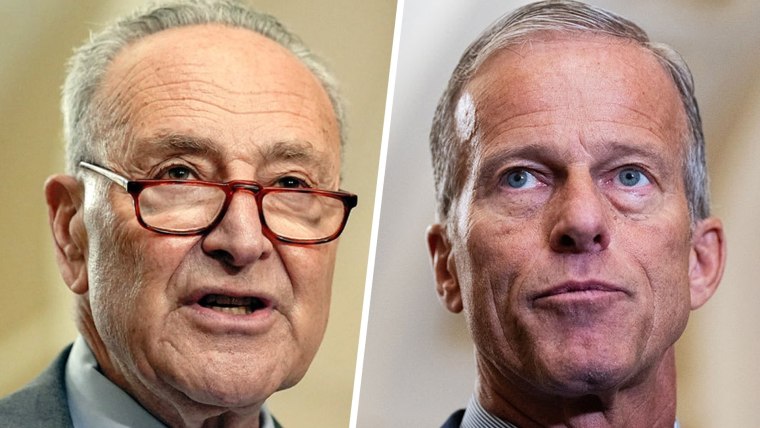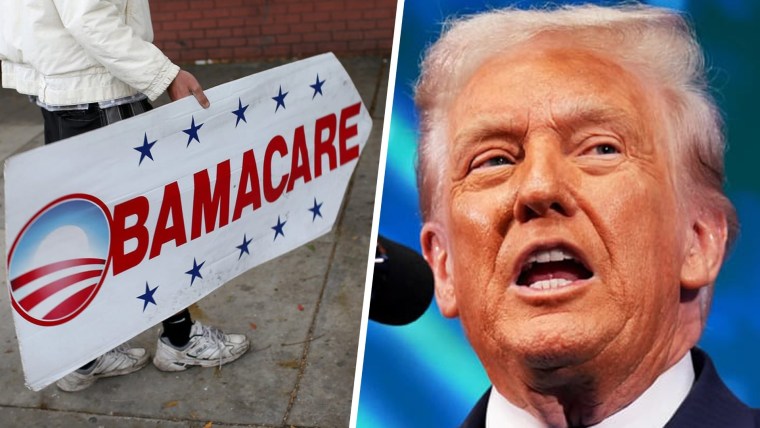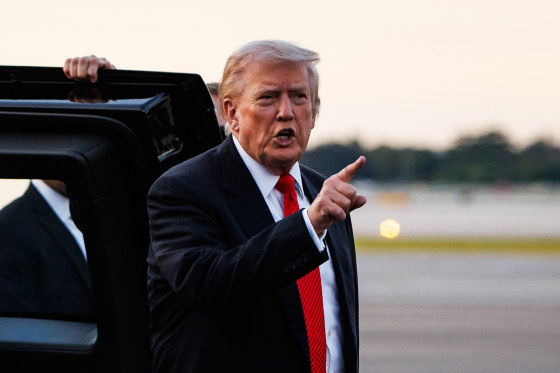After days of unsuccessfully venting online that Senate Republicans need to nuke the filibuster, President Donald Trump carried his frustrations into a private breakfast on Wednesday and directly pressured Republicans to end the Senate’s 60-vote threshold to end the longest funding lapse in U.S. history.
It didn’t work.
“He was pretty forceful on that,” Sen. Shelley Moore Capito, R-W.Va., said of Trump’s message to nuke the filibuster. “He’s frustrated that they won’t even keep the government open, we’re never gonna get anything done. And the only way to perform is to break the filibuster.”
Sen. Josh Hawley, R-Mo., told MSNBC that Trump’s filibuster message during the meeting was, “Get rid of it.”
“His argument is just that we’re not gonna be able to move anything across the floor unless we get rid of the filibuster, and I think, starting with the shutdown,” Hawley said.

One Senate Republican, granted anonymity to discuss the private gathering, said Trump told lawmakers the GOP would become a “dead party” if the conference does not do away with the filibuster, as Punchbowl News first reported.
“It’s time for Republicans to do what they have to do, and that’s terminate the filibuster,” Trump said publicly before the breakfast started, arguing that Democrats would do it if they take power, so the GOP should beat them to the punch.
“It’s the only way you can do it,” Trump said of ending the shutdown. “And if you don’t terminate the filibuster, you’ll be in bad shape. We won’t pass any legislation.”
As I’ve said before, there are not the votes there.”
Senate Majority Leader John Thune, R-S.D.
The president’s comments underscore the growing anxiety about the political fallout of the now-historic shutdown, as well as the series of defeats voters handed Republicans on Tuesday during off-year elections.
As Republicans pour over the disappointing election results, Trump seems to have decided that the historic shutdown is, at least in part, one of the reasons the GOP lost.
During the breakfast meeting, Trump told Senate Republicans that the shutdown has been “worse for us than for them,” claiming GOP lawmakers “are getting killed,” the Senate Republican said.
Still, despite his grim outlook, Trump’s plea to nuke the filibuster is falling flat among Senate Republicans.
“As I’ve said before, there are not the votes there,” Senate Majority Leader John Thune, R-S.D., told reporters after the breakfast. “And so, the main thing we need to be focused on right now, in my view, is get the government opened up again.”
Sen. Thom Tillis, R-N.C., a retiring lawmaker known for his bipartisan efforts on Capitol Hill, was more direct: “I will tell you with metaphysical certainty: This Congress is not gonna nuke the filibuster. Period. Full stop.”

Pressed on why he was so certain, Tillis said it was a numbers question. “It only takes third-grade math to figure out that, if you’ve got 15 or more members that are dug in, it’s not gonna happen,” he said.
Nuking the 60-vote filibuster would require support from at least 51 senators, an unlikely feat as a handful of Republicans voice opposition to the idea. It’s a similar circumstance to 2018, when Trump, during his first term, called on GOP senators to do away with the legislative hurdle — an appeal they rejected.
“I’m not ready to,” Sen. Mike Rounds, R-S.D., said of getting rid of the filibuster.
Accentuating the dicey feelings toward nuking the filibuster in the Senate GOP conference, Sen. Lindsey Graham, R-S.C., a close Trump ally, argued during the closed-door breakfast meeting that Republicans could still use reconciliation to pass their priorities with a simple majority. Trump, however, wasn’t having it.
“Lindsey, you and I both know that there’s so much you can’t do with reconciliation,” Trump said, according to the Senate Republican.
But even as GOP senators dismiss the idea, they recognize — in large part because of the election results on Tuesday — that the pressure of the shutdown is mounting.
It had an impact. I think people saw the shutdown, recognize that it’s Congress that makes that decision and we’re the party in power.”
Sen. Lisa Murkowski, R-Alaska
Republicans thought they would easily win the public relations battle over the shutdown, with Democrats refusing to support a House-passed spending bill over reservations about what wasn’t included in the bill — namely, an extension of Obamacare subsidies — rather than what was in the legislation.
But Trump and Republicans have muddled much of their messaging.
The president has repeatedly offered a highly misleading claim that the shutdown is over Democrats wanting to give undocumented immigrants free health care. He has also refused to negotiate with Democrats, with the House even taking the extraordinary step of staying out of legislative session since Sept. 19, in a gambit to force Senate Democrats to pass their temporary funding bill.
And Trump has unintentionally put some of the onus of the shutdown on Republicans, arguing that GOP senators have the power to end the standoff as soon as they end the filibuster.
Meanwhile, Democrats have been remarkably consistent in their messaging: The shutdown is about health care.

With enhanced subsidies for Obamacare ending at the conclusion of the year, Democrats want Republicans to come to the table and negotiate an extension of those tax credits. Republicans have refused.
At least one Republican on Capitol Hill said Tuesday night’s results reflected a clear winner in the shutdown blame game.
“I think it had an impact,” said Sen. Lisa Murkowski, R-Alaska. “I think people saw the shutdown, recognize that it’s Congress that makes that decision and we’re the party in power.”
Still, some senators are suggesting the end of the shutdown may be near, with rank-and-file senators on both sides of the aisle taking part in discussions — a potential bipartisan compromise that could take any need to nuke the filibuster off the table.
Asked for one word to describe those bipartisan discussions Wednesday afternoon, Sen. Jeanne Shaheen, D-N.H., had one that hasn’t been mentioned much during the record-breaking shutdown: “Positive.”

